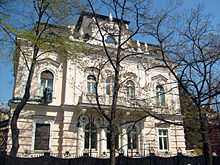
Back أتراك بلغاريا Arabic Bolqarıstan türkləri Azerbaijani بولغاریستان تورکلری AZB Туркі ў Балгарыі Byelorussian Турци в България Bulgarian Turcs de Bulgària Catalan Turecká menšina v Bulharsku Czech Turkoj en Bulgario Esperanto Turcos de Bulgaria Spanish ترکهای بلغارستان Persian
 | |
| Regions with significant populations | |
|---|---|
| 508,375 (2021 census)[1] | |
| 326,000 (2005)[2] | |
| 10,000–30,000[3][4] | |
| 500[5] | |
| 2,000 – 10,000[6][7] | |
| 4,807[8] | |
| 1,000[9] | |
| Languages | |
| Turkish · Bulgarian | |
| Religion | |
| |
| Part of a series of articles on |
| Turkish people |
|---|
 |


Bulgarian Turks (Bulgarian: български турци; Turkish: Bulgaristan Türkleri) are ethnic Turks from Bulgaria. According to the 2021 census, there were 508,375 Bulgarians of Turkish descent, roughly 8.4% of the population,[1] making them the country's largest ethnic minority. Bulgarian Turks also comprise the largest single population of Turks in the Balkans. They primarily live in the southern province of Kardzhali and the northeastern provinces of Shumen, Silistra, Razgrad and Targovishte. There is also a diaspora outside Bulgaria in countries such as Turkey, Austria, the Netherlands, Sweden, Norway and Romania, the most significant of which are the Bulgarian Turks in Turkey.
Bulgarian Turks are the descendants of Turkish settlers who entered the region after the Ottoman conquest of the Balkans in the late 14th and early 15th centuries, as well as Bulgarian converts to Islam who became Turkified during the centuries of Ottoman rule.[14][15] However, it has also been suggested that some Turks living today in Bulgaria may be direct ethnic descendants of earlier medieval Pecheneg, Oghuz, and Cuman Turkic tribes.[16][17][18][19] According to local tradition, following a resettlement policy Karamanid Turks (mainly from the Konya Vilayet, Nevşehir Vilayet and Niğde Vilayet of the Karaman Province) were settled mainly in the Kardzhali area by the sultans Mehmed the Conqueror, Selim and Mahmud II.[20] The Turkish community became an ethnic minority when the Principality of Bulgaria was established after the Russo-Turkish War of 1877–78. This community is of Turkish ethnic consciousness and differs from the majority Bulgarian ethnicity and the rest of the Bulgarian nation by its own language, religion, culture, customs, and traditions.
- ^ a b "Census 2021: 84.6% of population define themselves as Bulgarians, 8.4% Turks, 4.4% Roma". 24 November 2022. Archived from the original on 27 November 2022. Retrieved 27 November 2022.
- ^ Cite error: The named reference
tbmm.gov.trwas invoked but never defined (see the help page). - ^ "Turkish Bulgarians fastest-growing group of immigrants in The Netherlands – Bulgaria abroad". The Sofia Echo. Archived from the original on 10 August 2016. Retrieved 29 September 2015.
- ^ "Nieuwe Turk is Bulgaar|Binnenland". Telegraaf.nl. 21 July 2009. Archived from the original on 5 November 2012. Retrieved 29 September 2015.
- ^ "Bli medlem", eBas - Kontaktnätet, archived from the original on 2 November 2022, retrieved 17 July 2023
- ^ "Хиляди български турци не успяха да дадат своя вот в Кипър : : Novinar.bg". Novinar.net. Archived from the original on 29 December 2013. Retrieved 29 September 2015.
- ^ "Най-известната тв водеща в Северен Кипър се изправя пред камерата на "Другата България" – Фактор Нюз". Bgfactor.org. Archived from the original on 13 December 2010. Retrieved 29 September 2015.
- ^ "sln.be is for sale | www.belgischedomeinnamen.be" (PDF). Retrieved 30 January 2010.[dead link]
- ^ "Avusturya'daki Bulgaristan Türkleri hala Bulgar isimlerini neden taşıyor?". Balkan Türkleri Kültür ve Dayanışma Derneği. Archived from the original on 15 May 2019. Retrieved 14 May 2012.
- ^ H. T. Norris (1993). Islam in the Balkans: Religion and Society Between Europe and the Arab World. p. 98.
- ^ İlyas Üzüm (1988–2016). "KIZILBAŞ". TDV Encyclopedia of Islam (44+2 vols.) (in Turkish). Istanbul: Turkiye Diyanet Foundation, Centre for Islamic Studies.
- ^ Cite error: The named reference
relcensus1was invoked but never defined (see the help page). - ^ Cite error: The named reference
relcensus2was invoked but never defined (see the help page). - ^ Stein, Jonathan. The Politics of National Minority Participation in Post-communist Europe, p. 238. M.E. Sharpe, 2000. ISBN 0-7656-0528-7
- ^ R.J.Crampton. "A concise history of Bulgaria", p. 36. Cambridge University Press, 1997.
- ^ Hupchick 2002, pp.11
- ^ Nicole 1990, pp.45
- ^ Norris, Islam in the Balkans, pp. 146–47.
- ^ "Еркечки Великден | PDF to Flipbook". Archived from the original on 15 January 2018. Retrieved 15 October 2021.
- ^ "Професор Илбер Ортайлъ: Султаните Фатих и Махмуд са заселили Родопите с турци". Archived from the original on 2 February 2017. Retrieved 30 January 2017.
© MMXXIII Rich X Search. We shall prevail. All rights reserved. Rich X Search